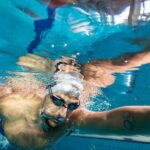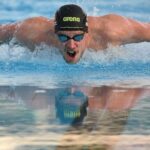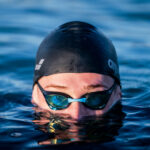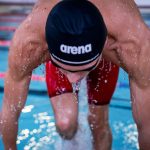Big ego & oozing confidence: probably a sprinter
Here’s a little game to play. Walk into a room of anonymous swimmers. Take a few minutes to assess the dynamic. Listen to some conversations. Take note of the body language. Now, review the information that has been gathered and try to answer this question: Can you identify the sprinters?
Chances are, you’ll be able to pick a few out, and not just because they’re the athletes who tower over others with their broad shoulders and thick chests. Chances are, they’ll be the ones telling an animated story, arguing boisterously or proclaiming themselves the king of the Checkers game that was played the previous night. Simply, they can’t handle not being the Big Dog.
“I think sprinters are their own breed,” said Brett Hawke, the head coach at Auburn University and a two-time Olympian (2000/2004) for Australia. “The best sprinters have huge egos and project confidence on the outside. I think they’re like that because they live on the edge of being amazing or terrible, and because they deal with hundredths of a second. But I think they’re insecure on the inside. There’s a real vulnerability to them, and I’m not sure why.”
Hawke knows a thing or two about sprinters, and the way they tick. As an athlete, Hawke established himself as a five-time national champion and once held the Australian record in the 50 freestyle. His portfolio includes individual international medals from the Commonwealth Games, Pan Pacific Championships and Goodwill Games, and relay medals from the World Championships.
On the coaching front, Hawke has been equally successful, guiding Auburn to an NCAA title in 2009 and developing some of the top sprinters in the world, including Olympic champion Cesar Cielo of Brazil and Frenchman Fred Bousquet. His current stable includes Brazilian Bruno Fratus, a medal contender in the 50 freestyle on home soil at this summer’s Olympic Games in Rio de Janeiro.

Hawke knows how he is going to get Fratus in position to peak for the biggest meet of his career, and it will require turning to the vast amount of information that he has gathered through the years. Consider his mind a notebook filled with tactics to bring out the best in his swimmers.
“For anyone, but particularly sprinters, it’s important they believe in themselves and project a huge confidence,” Hawke said. “They need the competition to know they are feeling good about what they are going to do. If their ego is not ginormous, they’re not going to win. At the same time, they need their coaches and teammates to tell them they are the best. They need constant assurance.”
Going hand in hand with their sizable egos, sprinters tend to bring considerable flair to the ready room and starting blocks. Gary Hall Jr., the American 10-time Olympic medalist, frequently wore a boxing robe and trunks on the deck, and routinely played to the crowd. When he was on top of the world, Cielo would hit himself. Whatever it took to get the blood flowing, that was the way to go.
For Hawke, there are other attributes he seeks in a potential sprint star.
“I want someone with an internal hunger and drive,” he said. “A teenage phenom might come along, but I’ll look for someone who might not be the best, but has strong qualities. They’ll have a desire to be the best and hate losing. Those characteristics are key.”
—————
Written by:
John Lohn
U.S. correspondent for SwimVortex. Author of three books, including They Ruled the Pool. Media Specialist. Lucky Husband. Dad of 3 little girls. Loving life.







